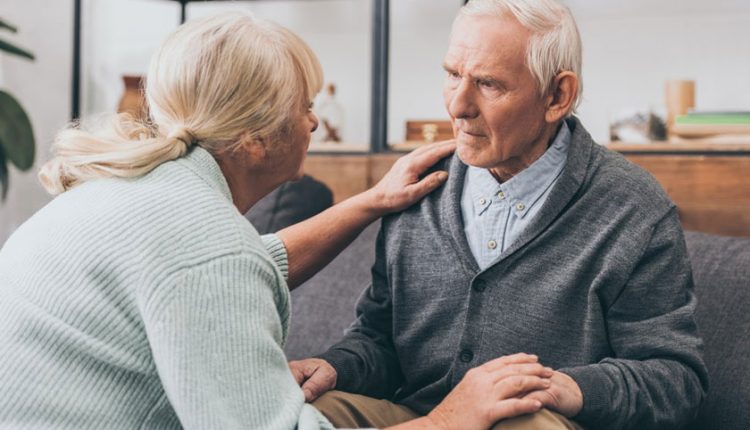
The aging process is unique to every human in the world, yet a few problems can prevent us from enjoying it. Alzheimer’s disease and dementia cause a lot of problems for the elderly. According to reports from the World Health Organization, over 50 million people worldwide are currently living with dementia, with a new case being diagnosed every three seconds. Dementia is a debilitating disease that strikes fear into the hearts of many. The incidence of it increases with age, with up to 5% of people over 65 being affected, but what is dementia? And how can we prevent dementia?
Contents
- 1 What Is Dementia?
- 2 Why Does Someone Deal with Dementia?
- 3 What Are the Symptoms of Dementia Disease?
- 4 Which Factors Will Increase the Risk of Dementia in People?
- 5 How Many Types of Dementia Exist?
- 6 Dementia Treatments
- 7 How Can We Prevent Dementia?
- 8 How to Behave with Someone with Dementia?
- 9 Final words
What Is Dementia?
The term dementia refers to a loss of memory, function, or decision-making that disrupts daily life. In other words, dementia is not a particular illness. Like heart disease, dementia is a general term encompassing many medical conditions, including Alzheimer’s disease.
The most prevalent form of dementia is Alzheimer’s disease. Even though it is most common in older people, dementia is not part of healthy aging.
However, the deterioration of cognitive ability caused by dementia is significant enough to affect everyday life and seniors’ independence.
Due to the spread of the disease globally, health organizations set 21 September each year as a day for teaching and sharing information about dementia and Alzheimer’s. However, the question is, can dementia truly be considered a dangerous side effect of aging? Read more about the difference between dementia and Alzheimer’s disease.
The answer is negative. Many seniors may live without the symptoms of dementia. Still, they may experience other diseases such as muscle and bone deterioration, hardening of arteries and vessels, or reduced memory functions. We can see the following signs of declining memory with age:
- Losing keys
- Forgetting names or words
- Having trouble remembering certain events in our lives.
The table below shows the percentage of Canadians with dispersion dementia based on their age.
Percent of Dementia Dispersion in Canada Based on Ages |
||||||
|
Age (years) |
Prevalence, % (95% confidence interval) |
Incidence, per 1000 seniors (95% confidence interval) |
||||
|
Male |
Female |
Total |
Male |
Female |
Total |
|
|
65–69 |
0.8 (0.8–0.8) |
0.7 (0.7–0.8) |
0.8 (0.8–0.8) |
3.0 (2.9–3.1) |
2.8 (2.6–2.9) |
2.9 (2.8–2.9) |
|
70–74 |
2.4 (2.3–2.4) |
(2.4–2.5) |
2.4 (2.4–2.4) |
5.7 (5.6–5.9) |
(5.5–5.9) |
5.7 (5.6–5.9) |
|
75–79 |
5.6 (5.6–5.7) |
6.1 (6.0–6.1) |
5.9 (5.8–5.9) |
13.1 (12.8–13.5) |
13.3 (12.9–13.6) |
13.2 (13.1–13.4) |
|
80–84 |
11.4 (11.2–11.5) |
13.1 (13.0–13.2) |
12.4 (12.3–12.4) |
25.6 (25.0–26.2) |
27.3 (26.7–27.8) |
26.5 (26.2–26.9) |
|
85+ |
20.4 (20.3–20.6) |
26.9 (26.7–27.0) |
24.6 (24.5–24.7) |
45.9 (45.0–46.7) |
53.1 (52.4–53.8) |
50.4 (49.9–51.0) |
|
Total |
5.6 (5.6–5.6) |
8.3 (8.3–8.4) |
7.1 (7.1–7.1) |
12.4 (12.3–12.6) |
15.8 (15.7–15.9) |
14.3 (14.2–14.4) |
Note: Saskatchewan’s data is not included in the data. The 95 percent confidence interval depicts an estimated set of values that, 19 times out of 20, is likely to include the true value.
Why Does Someone Deal with Dementia?
When brain cells are damaged, dementia develops. As a result of this injury, brain cells cannot communicate with each other. When brain cells can’t communicate properly, it can affect one’s thoughts, actions, and feelings. There are various types of dementia corresponding to different types of brain damage in certain brain regions. For example, Alzheimer’s disease is characterized by high levels of certain proteins inside and outside brain cells that prevent it from interacting.
In everything about Alzheimer’s disease, you can find essential information. Even though most of the changes in the brain that lead to dementia are irreversible and worsen with time, patients who suffer from the following conditions may be able to improve when treated:
- Depression
- Medication side effects
- Excess use of alcohol
- Thyroid problems
- Vitamin deficiencies

What Are the Symptoms of Dementia Disease?
Many diseases are progressive. Similarly, the symptoms of dementia appear progressively and worsen over time. Therefore, don’t neglect a senior’s symptoms and take them to the doctor as soon as possible if they have trouble remembering things or other activities that require thinking skills.
Subsequently, a professional examination can reveal a condition that may be treatable. However, dementia cannot be diagnosed with only one test. In other words, doctors diagnose Alzheimer’s disease and other forms of dementia based on a thorough medical history, clinical examination, laboratory tests, and distinct changes in perception and day-to-day function.
However, since different dementias’ signs and brain changes can overlap, it’s more challenging to pinpoint the exact form of dementia.
For instance, doctors can diagnose “dementia” without specifying a form in some cases. But, a professional such as a neurologist, psychiatrist, psychologist, or geriatrician may be required if this happens. Also, these are some common symptoms of dementia in seniors:
- Forget the appointments
- Reduction of short-term memory
- Forget the wallet or keys
- Difficulties in problem-solving, thinking or making a decision
- Forget to pay bills or deposits
- Unable to complete tasks on their own
- Forget the address of the home
Which Factors Will Increase the Risk of Dementia in People?
A major risk factor for dementia is getting older, with most cases occurring in people over 65.
In addition, dementia is more likely to affect people with dementia-afflicted parents or relatives. Moreover, dementia affects African Americans twice as frequently as it does other races as they age.
If not adequately controlled, high blood pressure, high cholesterol, and smoking raise the risk of dementia. In addition, head injuries, particularly severe or frequent, may increase the risk of dementia.
Nevertheless, some procedures, like a healthy lifestyle, may help prevent dementia.
How Many Types of Dementia Exist?
Alzheimer’s is the most common type of dementia, accounting for 60 to 70 percent of all cases of dementia. But there are other types of dementia, such as:
- Alzheimer’s disease
- Vascular dementia
- Lewy body dementia
- Fronto-temporal dementia
- Mixed dementia
- Reversible causes

Dementia Treatments
Treatment for dementia depends on its cause. For instance, no cure or therapy will delay or stop the development of most progressive dementias, including Alzheimer’s disease. However, several drug therapies may help to alleviate symptoms temporarily. For instance, the same medications used to treat Alzheimer’s disease are also used to treat the symptoms of other forms of dementia.
On the other hand, natural remedies can also help with dementia symptoms. For instance, the importance of a healthy lifestyle for seniors shows us how improving the lifestyle can help seniors prevent dementia.
Increased study support and participation in clinical trials can, in the end, lead to more successful new dementia therapies. Volunteers are desperately needed for clinical research and experiments on Alzheimer’s and other dementias right now.
How Can We Prevent Dementia?
Dementia risk factors, such as age and genetics, are unchangeable. However, researchers are also looking into the effects of other risk factors on brain health and dementia prevention. For instance, lifestyle modifications, such as a healthy diet, not smoking, regular exercise, and mental stimulation, can reduce the risk of cognitive impairment and prevent dementia.
Also, brain games like the best card games for seniors are good choices to keep your brain functioning and prevent dementia. Furthermore, using omega-3 fatty acids, fruits, vegetables, and whole grains is suitable for our brains, particularly for seniors.
How to Behave with Someone with Dementia?
It doesn’t come naturally to us to understand dementia, but we can learn. Improving your communication skills will make caring for a loved one less complicated and increase your relationship’s quality. In addition, in the top 10 podcasts for seniors 2021, you can find excellent podcasts they will enjoy.
Have a Kind Manner
Your voice tone and body language communicate your emotions and thoughts more effectively than your words. For instance, using your voice tone and body language, refer to your loved ones in a friendly and respectful manner.
Activate the Person’s Interest
Try reducing noise and distractions in the house. For example, you can try turning off the radio or television, closing the curtains or the door, or moving to a quieter place. Also, make sure you have their attention before speaking by addressing them by name, identifying yourself by name and connection, and using nonverbal signals and touch to keep them focused.
Moreover, in how to maintain the mental health of seniors, you can also read about acceptable behaviour with seniors, especially someone who deals with dementia or Alzheimer’s.

Explain Everything Clearly
Make your sentences and vocabulary as plain as possible. Slowly, clearly, and in a reassuring tone. For instance, use your normal voice; instead of raising your voice higher. After that, repeat your message or question if they do not understand it the first time.
In addition, use names of individuals and places instead of pronouns.
Pose Easy-to-Answer Questions
Always ask simple questions; yes/no questions are the most efficient. For instance, avoid posing open-ended questions or providing too many options. “Would you like to wear your white shirt or your blue shirt?” for example. Better still, show them the options—visual indications and help explain your question and direct them to answer.
Listen to Them with All of Your Heart
Wait patiently for your loved one’s answer. For instance, It’s OK to suggest terms if they’re having trouble coming up with a response. In addition, keep an eye out for nonverbal cues and body language, and respond accordingly.
Break Down Activities into Steps
Politely remind them of steps they forget and assist them with actions they can no longer complete independently. Many tasks become even more manageable as a result of this. For instance, you can help your loved ones by encouraging them to do what they can. Visual prompts can be extremely helpful, such as showing them where to place the dinner plate with your hand.
Reassure them and respond with affection
Dementia patients are often confused, nervous, and self-conscious. Furthermore, they are prone to getting mixed facts and recalling events that never happened. So, avoid persuading them that they are incorrect. In other words, keep your attention on the feelings they’re expressing (which are genuine); comfort, encourage and reassure them with verbal and physical expressions. When all else fails, holding hands, embracing, and praising the individual can be enough to get them to respond.
Talk About Good Memories
Reminiscing can be a relaxing and reassuring experience. However, many people with dementia may not recall what happened 45 minutes ago. What they may remember, strangely, are events from 45 years ago. As a result, refrain from asking questions that depend on short-term memory, such as what the individual had for lunch. For instance, ask general questions about the person’s distant history instead; this information is more likely to be remembered.

Always Keep Your Smile
Where necessary, use humour, but not to the other person’s disadvantage. People with dementia usually keep their social skills and are happy to joke with you. You can learn a lot from the elderly, so reading the life lessons we can learn from the elderly is a good choice for you.
Final words
The aging process is unique to each individual, but a few problems can prevent us from fully enjoying it. Alzheimer’s disease and dementia are common problems for the elderly. Even though most of the changes in the brain that lead to dementia are irreversible and worsen with time, patients may be able to improve when treated. Tell us if you have any questions regarding this article in the comment section.
These numbers are terrifying. How poorly we know about our brain and brain health. It makes me sad when someone forgets something or has odd behaviour, especially when they’re old; they face adverse reactions, sometimes even insulation. People should know behavioural changes are important, especially for seniors. These changes can be symptoms of something treatable or something that can be prevented.
One of our relatives had dementia. Her doctor told her that there are some easy methods to do in your home like music therapy, pet therapy, exercising regularly, staying socially active and eating a balanced diet. Now she has a trained dog, and she is so happy with him because he helps her cope with problems better than before. Generally, it’s essential to see your doctor regularly and do some tests to ensure your health.
I was unfortunate enough to see my grandfather go through such pain. Now every day I’m getting closer to his age at that time, and every day I’m more afraid of what’s going to happen to me if I end up like him. He had my grandmother and the whole family there for him. I’m single and childless, and I have no one. I wish things like diseases didn’t happen to lonely people.
Depression can boost dementia. You seem to need to talk with a therapist. Many other people are experiencing loneliness, and I’m sure you would be amazed to see how easy it is to make friends.
I liked this article, it’s very useful. I shared it with my friends. I think all of us need to know about dangerous diseases such as dementia because we can protect our bodies from them. now I knew many new things about seniors’ troubles and prepared myself better.
My father is over 65 and shows some of the symptoms mentioned in the article; for example, he sometimes forgets his wallet or keys at home, forgets to pay bills or deposits, and sometimes forgets to prepare or eat meals. should I be worried about dementia?
Dear Robert, as he is 65, I think it is better to consult a doctor about it; because he is probably showing the symptoms of dementia, but don’t forget that all of us are humans, and sometimes we all forget some things regardless of the age.
It is absolutely essential to seek advice from a professional.
Every person with dementia is different. What works for one person will not necessarily work for all but here are some strategies I use with my mom:
I never argue with her. If we disagree over something, I always back down. It’s hard enough having dementia without me thinking I’m the fount of all wisdom!
I never confront my mom with her mistakes. Cause guess what? They do not learn from their mistakes anymore.
I also never ask direct questions. I ask indirectly instead: ‘I wonder whether….?’ ‘I wonder who….?
Pressure to produce the correct answer is never helpful.
You are right, but I think it is better to ask yes-or-no questions. People with Alzheimer’s and dementia often don’t understand open-ended or indirect questions that require them to consider all options and formulate a response. Such questions can often seem confusing to those with the disease.
Some general ways are stated in the article about keeping away from dementia. But is there any special diet or food ingredients that are more effective in this respect? Knowing such things in advance can help us in helping our parents more.
I strongly believe that my grandmother might have dementia. My grandmother is 84 years old. She keeps repeating herself, asking the same questions, which is annoying, and she gets moody and very forgetful. Sometimes she can become very argumentative about the truth and denies specific facts. Her mom had dementia, though, and apparently, she stands a greater chance of getting it because her mom had it. Is she showing the symptoms of dementia? I wonder if anyone can help.